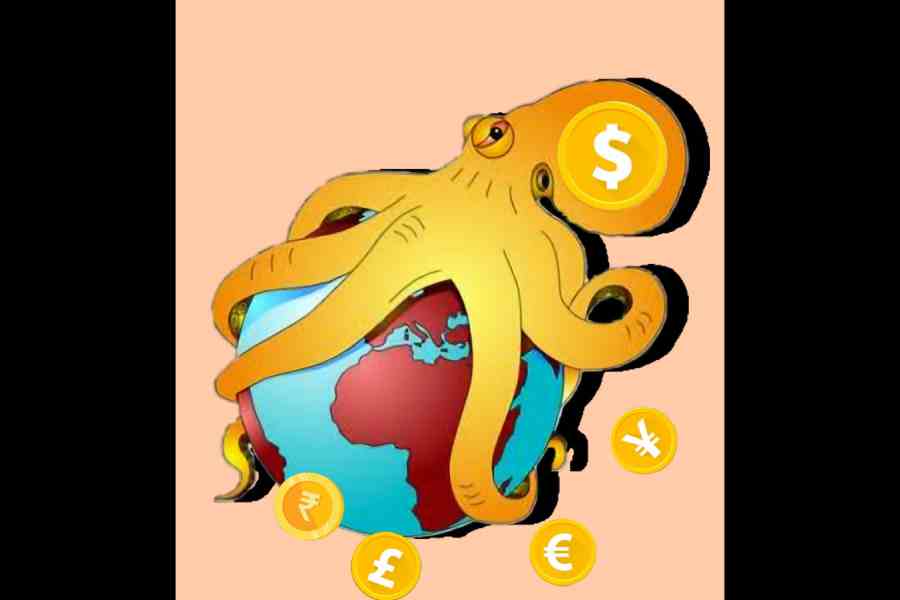There are two kinds of inequity associated with the current International Monetary and Financial System. One arises from the hegemonic role of the dollar. Even though the dollar is no longer convertible to gold at a fixed price (35 dollars to an ounce of gold), as it was under the original Bretton Woods system, after President Richard Nixon snapped that link, it is still considered ‘as good as gold’ in the minds of the world’s wealth-holders. The United States of America, in effect therefore, is sitting on a free gold mine; it can run huge current account deficits on its balance of payments and finance them by printing dollars. This enables it to finance wars abroad and maintain its global dominance.
The fact that the world’s wealth-holders perceive the dollar to be as good as gold is a result of this global dominance. The dollar is not only the unit of account but also the medium of circulation for a large volume of international transactions and, hence not surprisingly, a form of wealth-holding. The attempts of particular countries to move their foreign exchange reserves away from dollars to other currencies have often been met by US-engineered coup d’etats to topple their regimes; and after the de Gaulle era, other advanced capitalist countries have generally acquiesced to such violent counter-measures.
Likewise, countries not toeing the US line have often been punished by impounding their foreign exchange reserves held with Western banks. In fact, a background paper for the BRICS summit notes that nearly a third of all countries have been subjected to unilateral sanctions involving the impounding of their foreign currency (mainly dollar) holdings at one time or another. Iran, Venezuela, Cuba, North Korea, and Russia have been some notable victims of such economic aggression.
The second inequity of the current system lies in the fact that countries with persistent current account deficits on balance of payments are forced to make adjustments to eliminate such deficits (with the obvious exception of the US) rather than countries with surpluses. This is a patently irrational arrangement as can be seen below.
Consider a two-country world where one has a current surplus vis-à-vis the other. If the surplus country increases domestic absorption, then with its output remaining unchanged (for it will be close to full capacity anyway), its exports will decline; the deficit country, even with the same domestic absorption, will produce more as its imports decline. Taking both countries together, current imbalances would get eliminated while increasing the total output and employment. But if the deficit country is forced to adjust, then it will reduce its domestic absorption so that there will generally be a fall in total output and employment of the two countries taken together, and certainly of the deficit country, while eliminating imbalances. Put differently, adjustment by the deficit country generally reduces world aggregate demand; while adjustment by the surplus country increases it and is therefore preferable.
Third world countries’ dissatisfaction with Bretton Woods institutions arises for this reason: they have to adjust when they have a deficit through the imposition of ‘austerity’ on them. The reason why surplus countries are not forced to adjust is because, first, it is difficult to force them to do so; and second, they prefer to hold claims on deficit countries which gives them economic power over the latter, compared to increasing domestic absorption which is likely to entail an improvement in the living standards of their working people. To take a stark example, the problem of Greek debt to German banks could have been eliminated if the German government had paid every German worker a certain sum of money to take a vacation in Greece. But a capitalist State would not prefer that to having a dominant grip over Greece.
The proposals mooted at the Kazan Summit of BRICS for reforming the International Monetary and Financial System were extremely modest; more importantly, their focus was only on removing the dominance of the US dollar, not on overcoming the imposition of ‘austerity’ that creates unemployment and recession in the deficit countries. But unless the latter happens, the problem of domination of some countries over others, even within BRICS itself, will remain.
Suppose the BRICS idea of having a set of currencies, with fixed exchange rates among them, as substitute for the dollar is implemented; and assume for simplicity that BRICS countries trade only among themselves. Then within BRICS, a country with persistent current account deficit will be emitting large amounts of IOUs; even if other countries are initially willing to hold them, they will become unattractive over time. Maintenance of a fixed exchange rate for that currency will then become difficult, unless that country adopts recessionary ‘austerity’ measures to eliminate its deficit. The problem that plagues many third world countries under the current monetary and financial system will then reappear under the new system too. Of course, the hegemony of the dollar may have been undermined, which is undoubtedly an important and desirable objective, but the fundamental problem facing third world countries with deficit would have remained unaddressed.
Most proposals for reforming the world’s monetary and financial system suffer from this shortcoming; they are concerned with arrangements for providing cheaper finance on less strict ‘conditionalities’ to third world countries, which undoubtedly is an extremely worthwhile objective; but it is not enough. The objective must be to do away with the need for finance altogether, for which a necessary condition is that the surplus countries, not the deficit ones, should be forced to make adjustments to eliminate current account imbalances.
Prabhat Patnaik is Professor Emeritus, Centre for Economic Studies and Planning, Jawaharlal Nehru University, New Delhi










